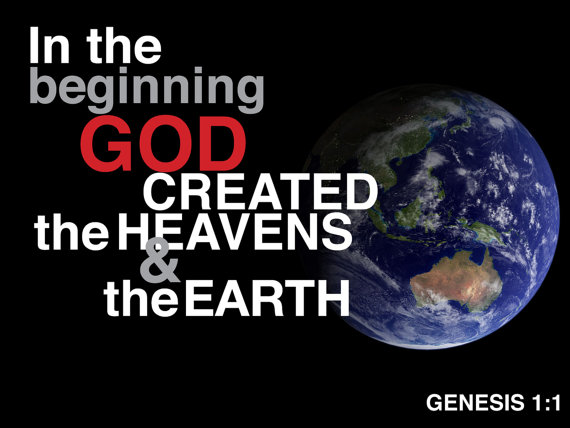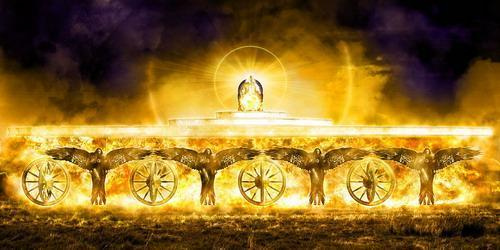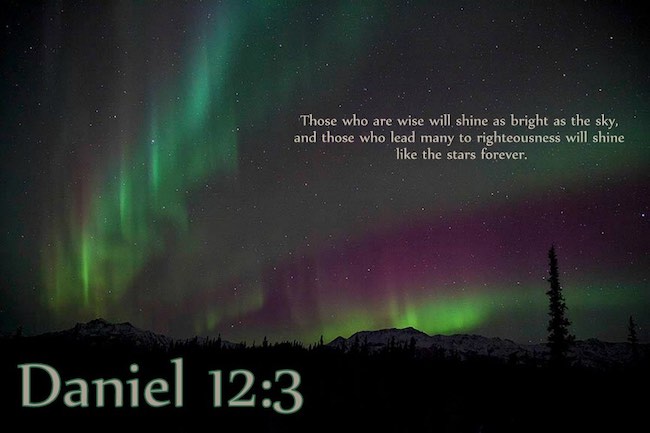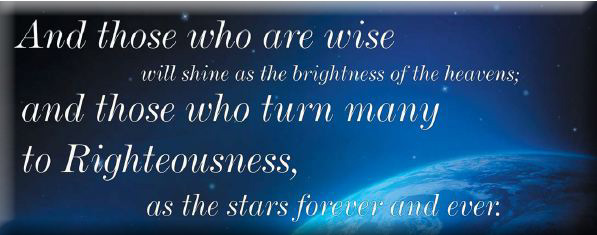This week begins anew the yearly cycle of reading through the weekly Torah Portion in keeping with Jewish tradition. We begin this week’s Torah Portion with the following sentence:
In the beginning God created the heavens and the earth. – Gen. 1:1
In this one statement, the very first verse in the Bible, we have revealed to us the origin of life as we know it. We are introduced to the Creator God who established a launching point of the world and gave us the foundations of the heavens and the earth.
Despite the various theories that exist today to explain the origins of life, the Bible alone provides a narrative of the Creator God as the source of all life as we know it. The One who created everything gave complete authority over His creation to His stewards:
Then God said, “Let Us make man in Our image, according to Our likeness; and let them rule over the fish of the sea and over the birds of the sky and over the cattle and over all the earth, and over every creeping thing that creeps on the earth.” God created man in His own image, in the image of God He created him; male and female He created them. – Gen. 1:26-27
The earth and all that was in it was given into the hands of man. God created man and woman, Adam and Eve, in His image and then commissioned them to rule over His creation.

Ruling Over the Earth
Adam and Eve began ruling over the earth in the safe and secure environment of the Garden of Eden. Although they were living in the paradise of God, there was work to be done. God had put Adam in the Garden of Eden to care for it with one clear command:
Then the LORD God took the man and put him into the garden of Eden to cultivate it and keep it. The LORD God commanded the man, saying, “From any tree of the garden you may eat freely; but from the tree of the knowledge of good and evil you shall not eat, for in the day that you eat from it you will surely die.” – Gen. 2:16-17
The commission to work the garden and the command of God to not eat from the tree of the knowledge of good and evil were clearly communicated to Adam who was also joined by his wife Eve (Gen. 2:18:23).
One day in the garden, the serpent approached Eve and questioned her about the command of God regarding eating from the trees in the garden. In his craftiness, the serpent asked the question, “Indeed, has God said that you should not eat from all of the trees of the Garden?” (Gen. 3:1) The serpent exaggerated God’s command so as to belittle it. Eve responded to the serpent that they could eat the fruit from all of the trees in the garden except the fruit of the tree in the middle of the garden; “God has said, ‘You shall not eat from it or touch it, or you will die.’” (Gen. 3:3)
Temptation and Deception
Even though both Adam and Eve seemed to have a clear understanding that God had commanded them to not eat from the fruit of the tree in the middle of the garden, the serpent gave Eve and her husband a tempting reason to take of the forbidden fruit:
The serpent said to the woman, “You surely will not die! For God knows that in the day you eat from it your eyes will be opened, and you will be like God, knowing good and evil.” When the woman saw that the tree was good for food, and that it was a delight to the eyes, and that the tree was desirable to make one wise, she took from its fruit and ate; and she gave also to her husband with her, and he ate. – Gen. 3:4-6
In an instant, both Eve and Adam had crossed the barrier that God had warned them not to cross and they could never turn back. Sin had entered into the world through the human race and the battle between good and evil would continually be in our midst.
The Desire to Be Like God
At the root of disobedience and sin there was deceptive by the serpent. The serpent began by lying to Eve and told her that they would not die by eating from the forbidden fruit. The serpent then explained that by eating of the forbidden fruit they would “be like God, knowing good and evil” (Gen. 3:5).
“To be like God” is a good thing if it is according to God’s plan, however, this was not God’s plan, but rather the plan of the evil one. The serpent had provided a deceptive way to be like God and was also tempting Adam and Eve with knowledge or wisdom. Eve desired the fruit with her eyes and took it and ate it because “the tree was desirable to make one wise” (Gen.3:6). The phrase “to make one wise” is one word in Hebrew: “להשכיל” – “lechaskil,” which means “to make wise, to act wisely, to give insight, to prosper, or to succeed.”
Ironically, the very desires that Adam and Eve were pursuing by eating of the forbidden fruit would elude them. In seeking to be like God they instead became like the evil serpent who had fallen from God’s presence. In seeking to be wise they became fools. In seeking to prosper and succeed they failed and brought sin and judgement upon themselves and all humanity. They quickly learned that God alone is the Creator and that He alone makes the rules.
Throughout the creation narrative and up to and including the fall of man, in Genesis chapters one through three, we are provided with a picture of how God intended this world to operate with authority and responsibility: in following God’s plan there is life but in deviating from God’s plan there is only death. I believe that this truth is clearly illustrated through a deeper study of the second day of creation.

The Heavens & The Earth
In the creation account we are continually reminded that God has established boundaries for His creation. God created an orderly universe with laws that govern creation which ultimately point us back to who He is: “Thus declares the LORD who stretches out the heavens, lays the foundation of the earth, and forms the spirit of man within him,…” – Zech. 12:1. Whenever we consider the creation around us, including our own existence, we should always remember that it is the LORD Himself who is the Creator and we are accountable to Him.
The Second Day of Creation
All of creation tells of the glory of God, however, there are certain aspects of creation that remind us of the distinction between God and His creation. I believe one of these clear distinctions was revealed on the second day of creation. On the second day of creation, God created a separation between heaven and earth:
Then God said, “Let there be an expanse in the midst of the waters, and let it separate the waters from the waters.” God made the expanse, and separated the waters which were below the expanse from the waters which were above the expanse; and it was so. God called the expanse heaven. And there was evening and there was morning, a second day. – Gen. 1:6-8
In separating the waters above from the waters below, God was establishing a sustainable climate for His creation with another environment above that reached to the heavens.
The Heavens Above
The Hebrew word used for “expanse” in the above verses is “רקיע” – “raki’ah,” which means “expanse” or “firmament.” This word is only used 17 times in the Jewish Scriptures with nine of those times appearing here in Genesis chapter one. This word is also used five times in the book of Ezekiel, twice in the Psalms, and once in the book of Daniel. In the verses quoted above we read, “God called the expanse heaven.” The “expanse” or “firmament” are the heavens and includes the clouds above and beyond.
As we continue to read about the events of creation week, we see that the expanse is not limited to the sky that we see above us but exceeds far into outer space:
Then God said, “Let there be lights in the expanse of the heavens to separate the day from the night, and let them be for signs and for seasons and for days and years; and let them be for lights in the expanse of the heavens to give light on the earth”; and it was so. God made the two great lights, the greater light to govern the day, and the lesser light to govern the night; He made the stars also. God placed them in the expanse of the heavens to give light on the earth, and to govern the day and the night, and to separate the light from the darkness; and God saw that it was good. There was evening and there was morning, a fourth day. – Gen. 1:14-19
God created the sun, the moon, and the stars on the fourth day and He used the “expanse of the heavens” to contain these great lights of the universe.
The Place of God’s Throne
In the vision of Ezekiel, which is found in Ezekiel chapter one, we read about unique living beings with four faces and four wings (Ezekiel 1:5-6). In the context of this vision, Ezekiel explained the location of the throne of God in a descriptive manner using the expression “expanse” – “רקיע” – “raki’ah” several times to describe the dwelling of the LORD:
Now over the heads of the living beings there was something like an expanse, like the awesome gleam of crystal, spread out over their heads… Now above the expanse that was over their heads there was something resembling a throne, like lapis lazuli in appearance; and on that which resembled a throne, high up, was a figure with the appearance of a man. Then I noticed from the appearance of His loins and upward something like glowing metal that looked like fire all around within it, and from the appearance of His loins and downward I saw something like fire; and there was a radiance around Him. As the appearance of the rainbow in the clouds on a rainy day, so was the appearance of the surrounding radiance. Such was the appearance of the likeness of the glory of the LORD. And when I saw it, I fell on my face and heard a voice speaking. – Ezekiel 1:22,26-28
In this vision, Ezekiel described the glory of the LORD in reference to His throne, which is located above the expanse. From this vision we learn about the place of God’s throne which is described as above the “expanse.”

God of the Heavens
The “expanse” – “רקיע” – “raki’ah” of the heavens is used in the Bible to explain the sky above us, the atmosphere above earth’s atmosphere, the heights of the world around us containing all of the stars in the heavens, and a reference point to the location of the very throne of God. The “expanse of the heavens” was created during the creation week and is used in the Bible to remind us of the wonderful God we serve:
The heavens are telling of the glory of God;
And their expanse is declaring the work of His hands.
Day to day pours forth speech,
And night to night reveals knowledge.
There is no speech, nor are there words;
Their voice is not heard.
Their line has gone out through all the earth,
And their utterances to the end of the world. – Psalm 19:1-4
All of creation testifies to who God is but the expanse of the heavens speaks of God’s handiwork for all to gaze at day and night.
Although God is omnipresent, we often associate His dwelling place as being in the heavens. The vision in Ezekiel, along with other Scriptures, speaks of the high and lofty One who sits over all of creation. The “expanse” – “רקיע” – “raki’ah” of the heavens is the general reference point that we use to understand God’s throne in context. He is holy and set apart as high and exalted. A proper understanding of the distinction between the heavens and the earth allows us to live in a holy fear and respect of the God of Creation.
We are created to worship the Creator. If we do not properly worship Him we will worship the created rather than the Creator and eventually put ourselves in His place. Adam and Eve sinned in their attempt to “be like God” and by striving to gain wisdom in a way that God had not prescribed. They failed to remember that they were created from the dust of the earth and that God’s throne was above the expanse of heaven.
Reaching the Heavens
I believe we see another example of man trying to be like God in an unholy manner after the flood when men tried to exalt themselves to the heavens:
They said, “Come, let us build for ourselves a city, and a tower whose top will reach into heaven, and let us make for ourselves a name, otherwise we will be scattered abroad over the face of the whole earth.” – Gen. 11:4
Men sought to make a name for themselves and set out to build a building which would reach into the heavens, the dwelling of God. Rather than worshiping the high and lofty One whose throne is above the expanse of heaven, they chose to try to reach God by their own means and somehow be like Him.
Worshiping God in His Expanse
The attempt of man to be like God in his own power will continually fail. The Bible reminds us of this again and again with account after account of those who tried to exalt themselves. The expanse of the heavens exists to remind us of the handiwork of God. God is the Creator and He alone is to be praised:
Praise the LORD!
Praise God in His sanctuary;
Praise Him in His mighty expanse.
Praise Him for His mighty deeds;
Praise Him according to His excellent greatness. – Psalm 150:1-2
The expanse of the heavens and all that they contain are to remind us to fear God and to worship Him.

The last time that the word “expanse” – “רקיע” – “raki’ah” is used in the Bible is found in the final chapter of the book of Daniel. An angel (probably the angel Gabriel – Daniel 9:21) was speaking to Daniel and informing him about the great distress at the end of time and how Daniel’s people, those who are written in the book, will be saved (Daniel 12:1-2). The angel also told Daniel these words:
Those who have insight will shine brightly like the brightness of the expanse of heaven, and those who lead the many to righteousness, like the stars forever and ever. – Daniel 12:3
The angel had been explaining to Daniel many of the prophetic events that would occur in the future, including the salvation of the nation of Israel at the end of days. The angel concluded by telling Daniel that “המשכלים” – “ha’maskilim” – “those who are wise wise” or “those who have insight” will shine like the expanse of heaven and like the stars.

Shining as the Stars of Heaven
In this one verse in Daniel we see the reversal of the two temptations of the fall of Adam and Eve: the desire to be wise and the desire to be like God (Gen. 3:4-6). Whereas Adam and Eve sought to be like God and to gain wisdom by their own devices and failed, we see that it was revealed to Daniel, that those who are wise and lead many to righteousness according to God’s standard, will shine like the expanse (“רקיע” – “raki’ah”) of heaven and like the stars forever and ever.
There is a path to wisdom and a way to be like God, and this way is by living in the fear of the LORD and by living a righteous life according to His Word. The creation account not only reminds us of the foundations of the universe that we live in but also of the holiness of God and how we as human beings are to relate to the Creator. Let us learn from the creation account and from this prophecy in Daniel to seek to be wise in Him and to shine like the stars of the heavens by leading others to righteousness.
Shabbat Shalom!
If you enjoyed reading this article, share it today with friends! We also invite you to sign up for our weekly Torah Portion commentary on the sidebar to the right.
Help keep our weekly commentaries free and available to all. Click here to donate today:
Torah Portion: Gen. 1:1 – Gen. 6:8
Haftara: Isaiah 42:5 – Isaiah 43:10
Return to Torah Portion Homepage
Copyright Jewels of Judaism. All rights reserved 2016


